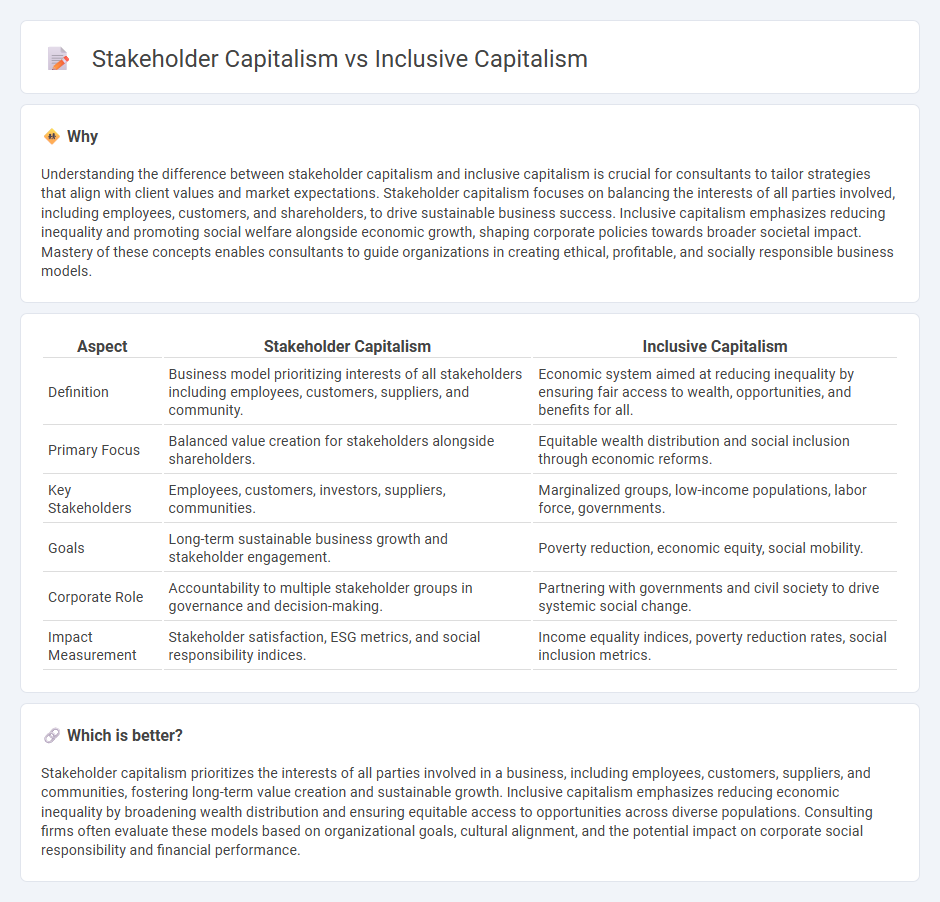
Stakeholder capitalism emphasizes balancing the interests of shareholders, employees, customers, and communities to create sustainable long-term value, while inclusive capitalism focuses on reducing economic disparities by ensuring equal access to opportunities and resources. Both models aim to reshape corporate responsibility and promote ethical business practices aligned with broader societal goals. Explore deeper insights into how consulting drives strategy in stakeholder and inclusive capitalism approaches.
Why it is important
Understanding the difference between stakeholder capitalism and inclusive capitalism is crucial for consultants to tailor strategies that align with client values and market expectations. Stakeholder capitalism focuses on balancing the interests of all parties involved, including employees, customers, and shareholders, to drive sustainable business success. Inclusive capitalism emphasizes reducing inequality and promoting social welfare alongside economic growth, shaping corporate policies towards broader societal impact. Mastery of these concepts enables consultants to guide organizations in creating ethical, profitable, and socially responsible business models.
Comparison Table
| Aspect | Stakeholder Capitalism | Inclusive Capitalism |
|---|---|---|
| Definition | Business model prioritizing interests of all stakeholders including employees, customers, suppliers, and community. | Economic system aimed at reducing inequality by ensuring fair access to wealth, opportunities, and benefits for all. |
| Primary Focus | Balanced value creation for stakeholders alongside shareholders. | Equitable wealth distribution and social inclusion through economic reforms. |
| Key Stakeholders | Employees, customers, investors, suppliers, communities. | Marginalized groups, low-income populations, labor force, governments. |
| Goals | Long-term sustainable business growth and stakeholder engagement. | Poverty reduction, economic equity, social mobility. |
| Corporate Role | Accountability to multiple stakeholder groups in governance and decision-making. | Partnering with governments and civil society to drive systemic social change. |
| Impact Measurement | Stakeholder satisfaction, ESG metrics, and social responsibility indices. | Income equality indices, poverty reduction rates, social inclusion metrics. |
Which is better?
Stakeholder capitalism prioritizes the interests of all parties involved in a business, including employees, customers, suppliers, and communities, fostering long-term value creation and sustainable growth. Inclusive capitalism emphasizes reducing economic inequality by broadening wealth distribution and ensuring equitable access to opportunities across diverse populations. Consulting firms often evaluate these models based on organizational goals, cultural alignment, and the potential impact on corporate social responsibility and financial performance.
Connection
Stakeholder capitalism and inclusive capitalism both emphasize creating long-term value by integrating the interests of diverse groups such as employees, customers, communities, and investors into corporate decision-making. These models promote equitable growth and social responsibility by aligning business strategies with environmental, social, and governance (ESG) principles. Emphasizing transparency and accountability drives sustainable outcomes, enhancing corporate reputation and stakeholder trust in consulting engagements.
Key Terms
Social Equity
Inclusive capitalism prioritizes equitable wealth distribution and social mobility, emphasizing systemic reforms to reduce economic disparities and promote access to opportunities for marginalized groups. Stakeholder capitalism, while considering broader interests beyond shareholders, integrates social equity by balancing the needs of employees, customers, communities, and the environment for sustainable value creation. Explore the nuanced approaches and impacts of these models on social equity to understand their roles in shaping a fairer economy.
Corporate Governance
Inclusive capitalism emphasizes equitable wealth distribution and social impact, promoting corporate governance structures that integrate diverse stakeholder interests, including employees, communities, and the environment. Stakeholder capitalism broadens corporate governance beyond shareholder primacy to address the needs of all stakeholders, ensuring long-term sustainable value and ethical business practices. Explore further to understand how these models reshape corporate governance frameworks and influence global business strategies.
Value Creation
Inclusive capitalism emphasizes broad-based economic participation and equitable wealth distribution to drive sustainable value creation for all stakeholders. Stakeholder capitalism prioritizes balancing the interests of shareholders, employees, customers, and communities, aiming to generate long-term value by integrating social and environmental considerations into business strategies. Explore how these models reshape corporate value creation in evolving market landscapes.
Source and External Links
The Essence of Inclusive Capitalism with Lynn Forester de Rothschild - Inclusive capitalism is an aspiration to reform capital markets so that the economic system becomes more inclusive, sustainable, dynamic, and trusted by rewarding companies that perform well in regard to people, society, and the planet, creating a virtuous cycle supporting all stakeholders.
Framework for Inclusive Capitalism - Inclusive capitalism focuses on aligning government, business, and investors to improve workers' lives through increased wages and economic growth, emphasizing diversity, equity, and inclusion as critical both morally and economically for sustainable growth and company profitability.
The Council for Inclusive Capitalism - This global community of business leaders promotes a more equitable and sustainable economic system where capitalism benefits are more broadly shared, going beyond profit to include the well-being of all stakeholders while addressing social and environmental challenges.
 dowidth.com
dowidth.com